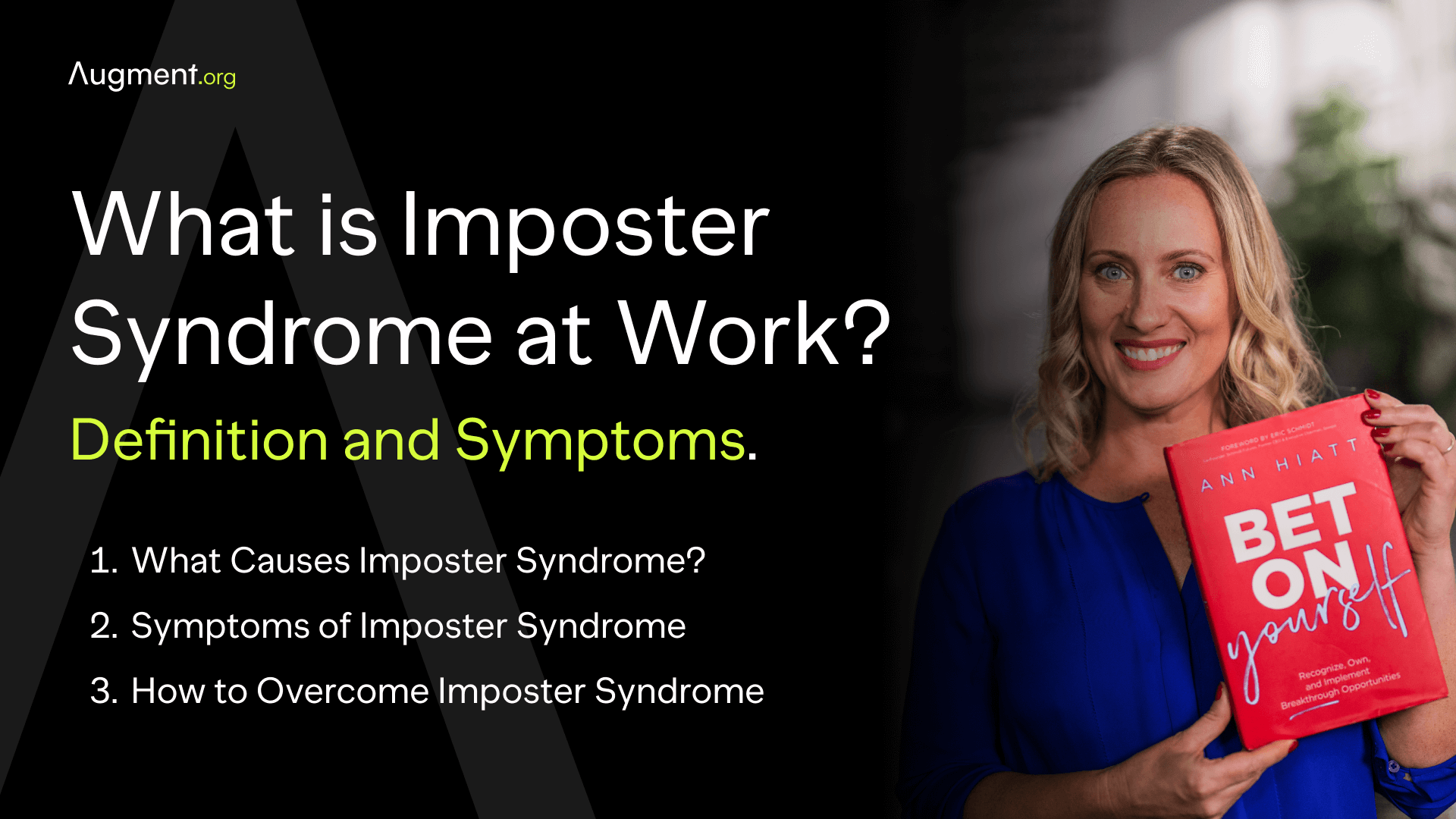What is Imposter Syndrome at Work? Definition and Symptoms
Workplace imposter syndrome often manifests as a persistent sense of self-doubt and fear of being exposed as a 'fraud', despite evident success and competence. Learn how to overcome imposter syndrome with tips to build self-confidence in the workplace.

What is Imposter Syndrome?
Imposter syndrome, imposter phenomenon, is a psychological pattern where individuals doubt their accomplishments, often feeling like a fraud despite evidence of their competence. It's not unusual in the workplace, affecting people across various jobs and career stages. This syndrome is characterized by persistent self-doubt and fear of being exposed as not skilled or talented enough, even when this is not the case.
People experiencing imposter syndrome frequently undervalue their own expertise and attribute their success to external factors like luck. They may feel they don't deserve the achievements they've earned, leading to feelings of inadequacy and the fear of being unable to replicate past successes. This can result in a cycle of negative self-talk and low self-esteem, impacting their work performance and personal life.
Imposter syndrome doesn't discriminate; entry-level workers often feel imposter syndrome, but executives can too, and it can be a very isolating feeling. Recognizing these feelings as a common phenomenon can be the first step in addressing them.
What Causes Imposter Syndrome?
The roots of imposter syndrome often lie in a complex mix of personality traits and past experiences. One major factor is the unrealistic expectations set by ourselves or others. When individuals, especially high achievers, constantly push themselves to meet exceedingly high standards, any shortcoming can amplify feelings of inadequacy and self-doubt.
External factors also play a significant role. In a competitive workplace, where accomplishments and skills are under constant scrutiny, it's easy to feel like a fraud. This sensation is particularly strong in environments that emphasize 'natural genius' over hard work, making individuals doubt their own abilities if they don't succeed effortlessly.
Negative self-talk and a harsh inner critic can worsen these feelings. People who suffer from imposter syndrome often have a persistent voice in their head, doubting their capabilities and attributing their success to external factors like luck or timing. This mindset leads to a fear of exposure and a belief that they don't truly belong where they are, despite evidence of their skills and accomplishments.
Past experiences, especially early in life or at the start of a new job, can trigger these feelings. A person who has been consistently underappreciated or overly criticized in their career or personal life might develop a sense that they are not good enough, regardless of their achievements. This is often seen when individuals take on new roles and feel they must prove themselves all over again, exacerbating feelings of being an imposter.
Symptoms of Imposter Syndrome
Imposter syndrome can manifest in various ways, impacting individuals' feelings and behaviors at work. Here are some common symptoms:
- Persistent Feelings of Self-Doubt: Despite evidence of their capabilities, individuals may constantly question their skills and achievements.
- Fear of Being Exposed: There's a prevalent fear of being 'found out' as not as competent or talented as others think.
- Attributing Success to External Factors: Successes are often attributed to luck, timing, or deceiving others into thinking they're more capable than they are.
- Negative Self-Talk: Engaging in internal dialogues that undermine their abilities and contributions.
- Overpreparing or Overworking: To avoid being perceived as a fraud, individuals might work excessively hard, often more than required.
- Avoiding New Challenges: A reluctance to take on new tasks or roles for fear of failure or being revealed as a fraud.
- Difficulty Accepting Praise: Dismissing or feeling uncomfortable with positive feedback, attributing it to politeness rather than genuine recognition.
- Feeling Like a Fraud: Despite accomplishments, individuals may feel they don’t truly deserve their position or status.
If these symptoms sound familiar, you might be suffering from imposter syndrome. Recognizing your symptoms is the first step in overcoming these feelings.
Types of Imposter Syndrome
Imposter syndrome can take several forms, each with its unique characteristics. Understanding these types can help individuals recognize their own experiences and seek appropriate strategies to combat them. Here are the common types:
- The Perfectionist: Perfectionists set extremely high expectations for themselves, and even a small mistake can make them question their competence. They often focus more on their flaws than their achievements.
- The Natural Genius: These individuals judge their worth by the ease and speed with which they master new skills. If they struggle to learn something quickly, they feel shame and self-doubt, thinking they are frauds.
- The Soloist: Soloists feel they must accomplish tasks on their own, and seeking help is seen as a sign of weakness or incompetence. They often struggle alone, even when collaboration could lead to better outcomes.
- The Expert: Experts measure their competence based on what and how much they know or can do. Feeling like they will never know enough, they constantly seek out additional certifications or training.
- The Superhero: These individuals push themselves to work as hard as possible to prove they're not impostors. They are often workaholics, believing the only way to fit in is to excel.
How to Overcome Imposter Syndrome
Overcoming imposter syndrome is a journey towards self-acceptance and confidence. Here are some strategies to help combat imposter syndrome:
- Acknowledge the Feelings: The first step is recognizing and accepting that you're experiencing imposter syndrome. Understand that it's a common experience shared by many successful people. Acknowledging these feelings as normal can reduce their power over you.
- Challenge Negative Thoughts: When plagued by self-doubt, actively challenge these thoughts. Ask yourself if there's concrete evidence to support these beliefs. Often, these thoughts are based more on feelings than facts. By questioning them, you can start to break the cycle of self-doubt and negative thinking.
- Celebrate Achievements: Keep a detailed record of your accomplishments, positive feedback, and moments of recognition. Regularly reviewing these can serve as tangible reminders of your skills and successes, helping to counteract feelings of being a fraud. Celebrating small wins is also crucial; it reinforces the idea that you're competent and capable.
- Talk About It: Sharing your feelings with trusted colleagues, mentors, or a career coach can be incredibly liberating. Often, you'll find that others have experienced similar feelings. This can normalize your experiences and provide you with different perspectives on how to deal with them.
- Set Realistic Expectations: Perfection is an unrealistic goal. Set achievable goals and learn to be kind to yourself when things don’t go exactly as planned. Understand that everyone makes mistakes and that they are not indicators of incompetence but opportunities for growth and learning.
- Develop a Growth Mindset: Adopting a growth mindset means focusing on learning and improving, rather than proving your worth. This perspective encourages you to view challenges and mistakes as opportunities to grow, reducing the pressure to perform perfectly.
- Seek Support: Building a support network is crucial. Whether it's colleagues, friends, or a professional mentor, having people to turn to for advice or encouragement can provide a more objective view of your abilities and help you navigate challenging situations.
- Practice Self-Compassion: Treat yourself with the same kindness and understanding you would offer a friend in your situation. Self-compassion involves recognizing that imperfection and struggling are part of the shared human experience. It can significantly counteract feelings of inadequacy.
- Reframe Your Thoughts: Change your perspective on tasks and challenges. Instead of viewing them as tests of your abilities, see them as opportunities to learn and grow. This shift in thinking can reduce anxiety and help you approach tasks with a more positive and productive mindset.
By employing these strategies, you can gradually change the way you perceive yourself and your abilities, leading to increased confidence and a more positive, realistic self-view. Remember, overcoming imposter syndrome doesn't happen overnight, but with persistence and self-compassion, progress is achievable.
How Leaders Can Prevent Imposter Syndrome Among Employees
Leaders play a pivotal role in shaping the work environment and can significantly influence whether their employees experience imposter syndrome. Here are some strategies leaders can adopt to help prevent these feelings in the workplace:
- Foster a Supportive Culture: Cultivate a work environment that values collaboration over competition. Encourage a culture where mistakes are seen as learning opportunities, not failures. This can help reduce the pressure employees feel to be perfect.
- Set Realistic Expectations: Leaders should set achievable goals and expectations. Unrealistic demands can exacerbate feelings of inadequacy and self-doubt among team members. Clear, attainable objectives help employees measure their success more accurately.
- Recognize and Celebrate Achievements: Regularly acknowledging employees' accomplishments can reinforce their sense of competence and belonging. This recognition should be specific and genuine, highlighting the individual's unique contributions to the team's success.
- Promote Open Communication: Encourage employees to share their thoughts and concerns. Creating an environment where team members feel safe to express doubts or fears can help them realize that they are not alone in their feelings.
- Provide Constructive Feedback: Feedback should be constructive and focused on behavior, not the person. This helps employees understand where they can improve without feeling personally attacked or inadequate.
- Encourage Professional Development: Offer opportunities for employees to learn and grow. Continuous learning environments help employees see themselves as evolving professionals, which can counteract feelings of being an imposter.
- Be a Role Model: Leaders can share their own experiences with self-doubt or imposter feelings. This transparency can normalize these feelings and show employees that overcoming them is part of professional growth.
- Offer Mentorship and Support: Pairing employees with mentors can provide them with guidance and reassurance. Mentors can help mentees navigate challenges and offer perspective when imposter feelings arise.
- Monitor Workload Balance: Overburdening employees can trigger feelings of inadequacy and burnout. Leaders should ensure that workloads are manageable and offer support or adjustments when needed.
By implementing these practices, leaders can create a more supportive and understanding work environment that actively counters the conditions that foster imposter syndrome. This not only benefits employees' mental well-being but also contributes to a more productive and positive workplace overall.



